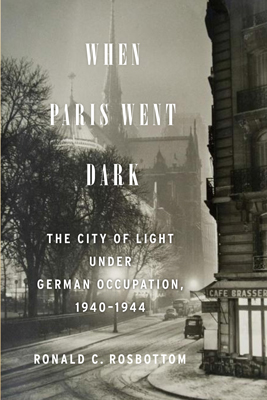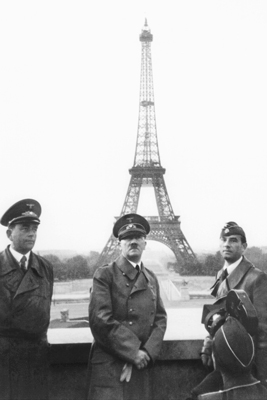“What was it like for the world’s most beloved city to be occupied by the world’s most heinous ideology?”
That, says Professor Ronald C. Rosbottom, is the question at the heart of his new book, When Paris Went Dark: The City of Light Under German Occupation, 1940–1944, which has drawn critical acclaim from The Wall Street Journal and the Minneapolis-St. Paul Star Tribune, among other media outlets, and was longlisted for a 2014 National Book Award in the nonfiction category.

“I’ve begun calling it a ‘tactile history,’” he says of the book. “It’s an attempt to show what it must have felt like just to get up in the morning—either as a German occupier, or as a Frenchman, or as a Jew—and walk out on the street, and the city looks exactly the same, but nothing’s the same.”
Almost “nothing’s the same” about this book itself, compared to Rosbottom’s previous work. His earlier monographs were all academic tomes on 18th-century French literature; When Paris Went Dark is his first publication by a trade press (Little, Brown and Co.). For Rosbottom, the Winifred L. Arms Professor in the Arts and Humanities and Professor of French and European Studies at Amherst, this has meant “learning how to tone down my academic rhetoric [and] learning to write for an audience who are anxious to get the information but who aren’t anxious to watch [me] show off.” It has also meant receiving a surprising number of curious, complimentary and critical messages from that audience. In one recent email, a stranger told the professor:
After reading your book, I now see why my Uncle Bud was so disgusted with serving in France after the war. I learned so much from your book, and I really enjoyed it. I also liked the many words you use that I had to look up in the dictionary to find their meaning.
But the most “flattering” and “stunning surprise” for Rosbottom has been the National Book Award nomination, about which he had no inkling until the morning in September when the longlist was publicly announced. “I started reading my email, and I told my wife, ‘You’re not gonna believe this,’” he remembers. “[In October] they came out with the shortlist, and I must say, I think I was more relieved that this waiting period was over than disappointed that I didn’t get it.” (Rosbottom is just the latest of several Amherst-affiliated nominees and winners of the prestigious award, including poets Richard Wilbur ’42 and David Ferry ’46 and nonfiction writers John W. Dower ’59 and Justin Spring ’84.)
The professor credits Amherst for giving him not only “the intellectual freedom” to shift his academic focus to 20th-century France, but also sabbaticals and funding so he could travel to do research for the book. Its subject matter is closely related to that of “Pariscape,” a first-year seminar he has been developing and teaching for some 15 years. He says he first tried out a lot of the book’s ideas on his students, and he spoke about his research to colleagues as part of Amherst’s Faculty Colloquium Series.
He’s also spoken at the Smithsonian and at events for alumni of Amherst and Princeton, and his lectures are always crowded with eager listeners who ask thoughtful questions. “It’s not me—it’s this topic of Paris and Hitler,” he says. “There’s something about everyone’s favorite city being under control for four years by the Germans that just seems to fascinate people.”

When Paris Went Dark was the September 2014 Featured Book of the Month for the Amherst Reads online book club. Read an excerpt from the book and a review by Rand Richards Cooper ’80, and listen to a conversation between Rosbottom and Professor of French Leah Hewitt.